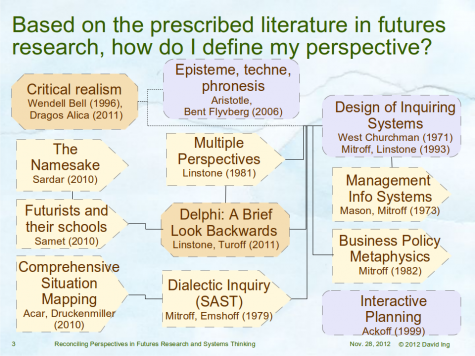The postgraduate course on Philosophical, Methodological and Pragmatic Approaches to Scientific Futures Research was offered by the Finnish Futures Academy at the University of Turku at the end of November 2012. I had never taken a course on scientific futures research before. I had never been to Turku before. Since I was scheduled to be Finland in mid-November, this presented an opportunity to get expert knowledge from leaders in future studies. I registered for the course.
In the typical style of Finnish intensive courses, a long list of articles was prescribed in advance. On the course schedule, a lecture for systemic approaches — naming Soft Systems Methodology — was slated on the last of three days. Working through the articles, the ties between futures studies and systems thinking led me to read about their parallel development, particularly through the 1970s. While most graduate students would try to relate the course content to their thesis, I’m so far along on my dissertation that that wouldn’t be productive. Thus, for my presentation, I decided to talk about the prescribed readings in futures research from my perspective founded in systems thinking.
The philosophy of Finnish school of scientific futures is based much in critical realism (via Alan Musgrave) through Wendell Bell (honoured in an August 2011 issue of Futures, edited by Paul Dragos Aligica). I came to realize that my view of the world is based much more on foundations on the design of inquiring systems, originating from C. West Churchman.
The first day of the course was scheduled for student presentations. I had requested to be scheduled near the end of the afternoon. One of the instructor facilitators was Osmo Kuusi. As I started my presentation, he asked if I was knew of the work of Ian Mitroff. I then brought up the slide that described the overall context for my thinking. Kuusi said that 20 years earlier, he had been encouraged to translate all of the works of Ian Mitroff into Finnish, but had declined to do so.
In the background reading of “Futurists and their schools” (Samet 2010), and Comprehensive Situation Mapping (Acar and Druckenmiller, 2010), I rediscovered the work on Dialectic Inquiry (Mitroff and Emshoff, 1979), and updated the Wikipedia page on Strategic Assumption Surfacing and Testing.
In preparation the presentation for class, I included some slides to describe the design of inquiring systems in order to enable intelligibility. When Kuusi saw these slides, he asked to borrow them for lectures on the following days.
By the end of the class, I came to have an understanding of the way that scientific futures research is conducted. I’m clearly more oriented towards the perspectives of systems thinkers, which includes a respect for other approaches such as the evolved Delphi method.
References
Acar, William, and Douglas A. Druckenmiller. 2010. “Designing Insightful Inquiring Systems for Sustainable Organizational Foresight.” Futures42 (4): 405–416. doi:10.1016/j.futures.2009.11.025. http://dx.doi.org/10.1016/j.futures.2009.11.025.
Mitroff, Ian I., and James R. Emshoff. 1979. “On Strategic Assumption-Making: A Dialectical Approach to Policy and Planning.” The Academy of Management Review4 (1) (January): 1. doi:10.2307/257398. http://dx.doi.org/10.2307/257398.
Samet, Robert H. 2010. “Futurists and Their Schools: A Response to Ziauddin Sardar’s ‘the Namesake’.” Futures 42 (8) (October 1): 895–900. doi:10.1016/j.futures.2010.04.026. http://dx.doi.org/10.1016/j.futures.2010.04.026.
Sardar, Ziauddin. 2010. “The Namesake: Futures; Futures Studies; Futurology; Futuristic; foresight—What’s in a Name?” Futures 42 (3) (April): 177–184. doi:10.1016/j.futures.2009.11.001. http://dx.doi.org/10.1016/j.futures.2009.11.001.



